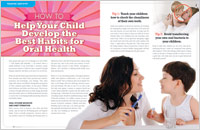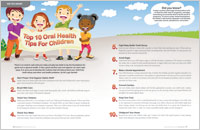 Your child won't keep his or her first teeth forever, but that doesn't mean your child doesn't need conscientious dental care. Maintaining your child's dental health now will provide health benefits well into adulthood, as primary (baby) teeth serve some extremely important functions.
Your child won't keep his or her first teeth forever, but that doesn't mean your child doesn't need conscientious dental care. Maintaining your child's dental health now will provide health benefits well into adulthood, as primary (baby) teeth serve some extremely important functions.
For one thing, primary teeth serve as guides for the eruption of permanent (adult) teeth, holding the space into which these new teeth will erupt. The crowns (tops) of the permanent teeth actually push against the roots of the baby teeth, causing them to resorb, or melt away. In this way, the adult teeth can take their proper place.
What's more, your child's primary teeth will be there for most of childhood, helping your child to bite, chew and speak. For the first six or so years, he or she will be relying on primary teeth exclusively to perform these important functions. Until around age 12, your child will have a mix of primary and permanent teeth. You will want to make sure those teeth stay healthy and are lost naturally — when it's time.
Your Child's First Teeth
Your child's 20 baby teeth will begin to appear usually between six and nine months, though in some cases it may start as early as three months or even later than 12 months. The two lower front teeth tend to erupt first. Sometimes your baby can experience teething discomfort during this process. If so, there are courses of action to help make your child more comfortable.
Your Child's First Dental Appointment
The American Academy of Pediatric Dentistry recommends that your child see a dentist by his/her first birthday. Though this may sound early, learning proper pediatric oral hygiene techniques, checking for cavities, and watching for developmental problems is extremely important.
There are a number of forms of tooth decay that can affect babies and small children. Early Childhood Caries (tooth decay) can develop rapidly, progressing from the hard, outer enamel layer of a tooth into the softer, inner dentin in six months or less.
Most of all, if you start brining your child to the dentist at a young age there is less of a chance for them to develop dental decay and will create more positive dental experiences in the future.
Pediatric Dental Treatments
There are a variety of dental treatments offered to prevent tooth decay in children, or to save or repair teeth when necessary. They include:
Topical Fluoride — Fluoride incorporates into the enamel of teeth, making it harder and more resistant to decay. Although there is a small amount of fluoride in toothpastes and in some drinking water supplies, a higher concentration can be applied professionally to your child's teeth for maximum protection.
Dental Sealants — A thin, white coating can be applied at the dental office to prevent cavities by sealing the little grooves on the chewing surfaces of back teeth known as “pits and fissures.” These little crevices become the perfect environments for decay-causing bacteria. Immature tooth enamel is more permeable and therefore less resistant to tooth decay. Dental sealants are easy to apply and provide years of protection.
Dental Restorations — If your child develops any cavities, we are able to restore those teeth to help prevent the decay from getting larger and causing more problems. If the cavity is small or moderate in size, we typically will recommend restoring the tooth with a white restoration/filling. If the cavity is larger, we may recommend placing a crown on the tooth.
Bonding — Chips and minor fractures to front teeth — common childhood occurrences — can be repaired with tooth-colored bonding materials. These lifelike resins made of plastic and glass can be used on baby teeth as well as permanent teeth and last until the youngster has completed facial growth.
Orthodontic Concerns
By around age 7, many malocclusions have become evident. Interceptive orthodontic treatment around this time may help direct proper tooth positioning and/or jaw growth, eliminating or simplifying the need for later treatment. There are many orthodontic problems that can be detected early and are examples of why a trained professional should evaluate your child during his/her growth and development. Even though we do not provide orthodontic treatment at our office, we are happy to evaluate your child's bite ("occlusion") and refer to an orthodontist in the area if necessary.
Sports & Your Child's Teeth
If your child is active in sports, a mouthguard is a highly recommended safeguard. According to the American Dental Association, an athlete is 60 times more likely to suffer dental harm when not wearing one of these protective devices. Mouthguards not only protect the teeth, but also greatly reduce the chance of a concussion during a sports related trauma.
For more information call Longmont Pediatric Dentistry at 303-776-1194!
Related Articles on Pediatric Dentistry

Dentistry and Oral Health for Children Dear Doctor magazine brings you this wide-ranging overview of milestones and transitions in your child's dental development. Learn how to protect your children from tooth decay, dental injuries, and unhealthy habits while getting them started on the road to a lifetime of oral health and general well-being... Read Article

Pregnancy & Oral Health Pregnancy is generally thought of as the time when a woman strives to be particularly aware of the need for better health. Many women, though, may not be aware of the link that exists between their oral health and their systemic (general) health, as well as the impact this can have on a developing child. Learn about how to care for yourself and your baby... Read Article

How to Help Your Child Develop the Best Habits for Oral Health Proper oral health habits are easy to learn — and lead to behaviors that result in lifelong dental health. And the time to begin is as soon as your child's first baby teeth appear. From toothbrushing for your toddler to helping your teenager stay away from tobacco, Dear Doctor magazine offers the most important tips for healthy habit formation through childhood and beyond... Read Article

Top 10 Oral Health Tips for Children There's no need to wait until your baby actually has teeth to lay the foundations for good oral or general health. In fact, good nutrition and oral hygiene can start right away. It is up to you to develop the routines that will help protect your child from tooth decay and other oral health problems. So let's get started... Read Article


